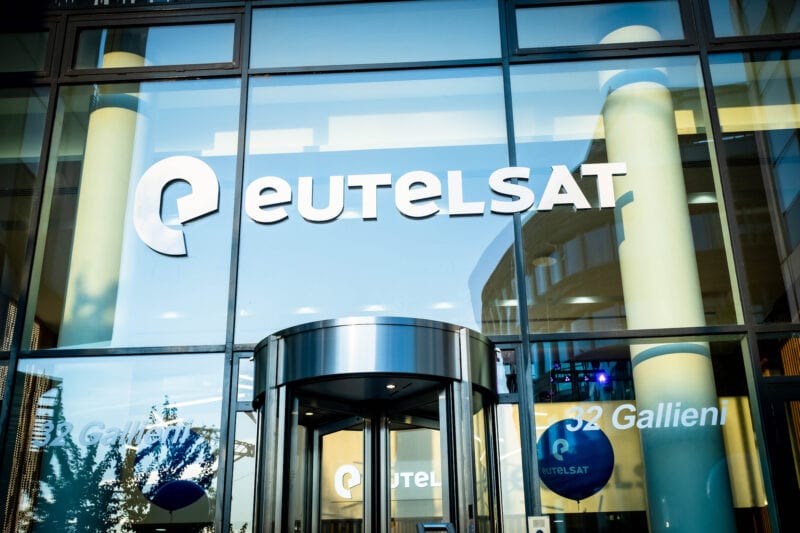Latest News

Eutelsat’s headquarters in Paris. Photo: Eutelsat
Eutelsat Communications‘ fiscal performance in the first-half of its 2021-2022 financial year (H1) will result in a delay in the company’s return to growth strategy, as revenues fell in some of its key verticals. In its H1 2021-2022 results posted Thursday, the French satellite operator said it is now forecasting a return to growth in 2023-2024, and had previously expected to see that return in the 2022/23 fiscal year.
In addition, Eutelsat delayed Konnect VHTS entry into service from the first half to the second half of calendar year 2023. The Eutelsat 10B mobile connectivity satellite’s entry into service has been delayed, but it is still expected in H1 2023. Eutelsat said this is due to the impact of manufacturing delays from the pandemic and follow-on effects, including pairing difficulties and launch rescheduling.
Eutelsat’s revenues dropped nearly 10% during the six month period ending December 2021, compared to the same time period in 2020. In H1, Eutelsat achieved revenues of just over 572 million euros ($650.3 million), a near 60 million euros ($68.2 million) fall compared to the same stage last year.
Eutelsat’s new CEO Eva Berneke, who took over from Rodolphe Belmer at the start of this year, highlighted the fact in the six months to the end of December, Eutelsat saw a number of important commercial and operational milestones, notably with the entry into service of Eutelsat Quantum. She also highlighted strong progress with its fixed broadband roll-out, as well as a cementing of its position in OneWeb and the receipt of the first tranche of its C-band proceeds.
“Newly at the helm, I am impressed by the technical expertise, asset quality and long-term commercial traction within Eutelsat,” Berneke said. “Although we have mechanically revised down our medium-term revenue expectations on the back of delayed availability of capacity, I am confident we have the elements in place to enable us to return to growth from FY 2023-24 and continue to deliver long-term value to our shareholders.”
In H1, revenues from Broadcast, Eutelsat’s largest segment, were 351 million euros ($399 million), a drop of close to 8% compared to the same stage last year. Broadcast now represents just over 60% of Eutelsat’s overall revenues. Eutelsat attributed the decline to lower revenues in Europe due largely to the carry-forward effect of a slowdown in the pace of new business last year.
Revenue for Fixed Broadband was 30 million euros ($34.1 million) in H1 — a 37% increase compared to last year. Fixed Broadband now accounts for 5 percent of Eutelsat’s overall revenues. Eutelsat said this growth reflects wholesale agreements with Orange, TIM and, Hispasat as well as growth of the company’s African operations.
Government revenues accounted for 74 million euros ($84.1 million), which down 3.8% compared to the same stage last year. Government equates to around 13 percent of Eutelsat’s overall revenues.
Data and Professional Video reported 78 million euros ($89 million), down 4% compared to the prior year. Mobile Connectivity reported 37 million euros ($42 million), up 9.8% compared to the prior year, due to a contract with Anuvu.
Eutelsat is now expecting to fall in the lower range of its guidance for the year, at 1.11 billion to 1.15 billion euros, reducing the top end of the range to 1.13 billion euros. The company said a return to topline growth in FY 2022-23 is no longer achievable, with the satellite delays, although the trend will materially improve relative to FY 2021-22.
The results got a mixed reaction from leading analysts’ that cover the stock.
Roshan Ranjit, a satellite equity analyst at Deutsche Bank (DB) said in a research note, that EBITDA was 1.9% ahead of DB’s estimates and 0.9% ahead of consensus. However, he said there was “disappointment” around the guidance message.
“For FY 21/22, revenue guidance is now expected at the lower end of the range, hence the top end is now 1.13 billion euros, with consensus adjusted for FX at 1.12 billion euros in line with the new mid-point. This decrease stems from a cautious outlook on the Government segment (spring renewal), despite a good Q2 performance, and a slower Middle East resale market. Longer term, given launch delays for Konnect VHTS and Eutelsat 10B, this has a mechanical effect on the return to growth guidance, which is now pushed out by one year FY 23/24. vs. FY 22/23 before,” he said.
Ben Lyons, a satellite equity analyst at Credit Suisse said in a research note, “We believe the main discussion point will be around the downward change to guidance where the company is now expecting top-line revenues to inflect one year later in FY 23/24 due to a delay in the growth asset Konnect VHTS and to a lesser degree 10B. Konnect VHTS has experienced a delay from the manufacturer which is impacting the launch timeline. Consensus previously expected flat revenues in FY 23.”
Lyons added that the revenue guidance for FY 22 was also partially downgraded. “Replacing the Nilesat capacity at 7/8 degrees has proved slower than first expected and the lower than usual Government renewal last year due to the rapid Afghanistan withdrawal are the reasons cited for the change in revenue guidance,” he said.
In terms of positive things to come out of the results, Lyons added, “Mobility beat consensus by +15% in Q2 FY 22 on our estimates, driven by a new contract in MENA onboard Quantum and an extension in maritime signed with Marlink. The company expects double-digit growth this year in that segment,” he said. “The cost performance was good with operating costs -5.5% year-on-year, a combination of low exposure to energy costs, a wage freeze and the LEAP 2 program producing 24 million euros ($27.3 million) in cost savings.”
Get the latest Via Satellite news!
Subscribe Now